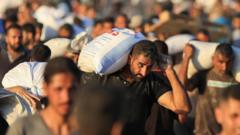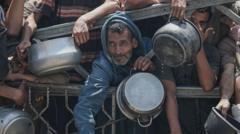In the aftermath of an Israeli airstrike on Al-Baqa Cafe, a purported refuge and gathering spot in Gaza, the human cost of conflict is starkly illustrated. On June 30, the cafe was hit, resulting in the tragic loss of 32 lives, including journalists, artists, and innocents seeking brief moments of solace. This incident underscores the indiscriminate nature of warfare as rising tensions turn once-peaceful places into sites of mourning and chaos.
A Seaside Refuge in Gaza: The Human Toll of the Israeli Airstrike

A Seaside Refuge in Gaza: The Human Toll of the Israeli Airstrike
The Israeli bombing of Al-Baqa Cafe highlights the devastating impact of conflict on civilian lives amidst ongoing hostilities in Gaza.
The cafe had long been a place for residents to escape the harsh realities of life in conflict-torn Gaza. Mohammed Abu Shamala, a 25-year-old aid worker present during the bombing, described the scene as chairs and dust filled the air, leaving him wondering if he would survive. The Israeli military justified its strike by claiming Hamas operatives were targeted, yet the cafe's diverse clientele—a mixture of families, friends, and artists—reveals the broader tragedy of civilian casualties.
The ongoing siege on Gaza has led to an alarming rise in starvation deaths, with health officials reporting over 60,000 fatalities since October 2023, a grim statistic that includes many children. Al-Baqa Cafe, known for its Wi-Fi connection and sense of community, had recently reopened after an earlier ceasefire. It was a cherished location among locals, embodying a semblance of normalcy in a time of chaos.
Among those lost in the airstrike were promising young lives like Ismail Abu Hatab, a photographer, and Frans al-Salmi, an artist dedicated to helping needy children. Their aspirations of leaving Gaza to find success have been silenced, along with dreams of friendship and family gatherings that embodied life before the chaos.
As survivors grapple with the emotional scars left behind by the violence, the profound changes inflicted on daily life are palpable. The airstrike has transformed a beloved cafe into a painful reminder of loss and horror amidst ongoing warfare. Local manager, Yaqoub Al-Baqa, voiced the devastation felt by those who knew and loved the cafe and the people it served, clarifying its non-military purpose.
In the wake of this tragedy, Gazans remain caught in an unyielding cycle of violence and humanitarian crisis, leaving many to wonder if places of refuge can ever truly exist in a backdrop of war.
As reconstruction efforts begin, the resilience of the community may hinge on remembering not just what was lost, but how to forge a path forward amid endless obstacles.
---
Isabel Kershner and Adam Rasgon contributed reporting from Jerusalem. Vivian Yee is a Times reporter covering North Africa and the broader Middle East, based in Cairo.
The ongoing siege on Gaza has led to an alarming rise in starvation deaths, with health officials reporting over 60,000 fatalities since October 2023, a grim statistic that includes many children. Al-Baqa Cafe, known for its Wi-Fi connection and sense of community, had recently reopened after an earlier ceasefire. It was a cherished location among locals, embodying a semblance of normalcy in a time of chaos.
Among those lost in the airstrike were promising young lives like Ismail Abu Hatab, a photographer, and Frans al-Salmi, an artist dedicated to helping needy children. Their aspirations of leaving Gaza to find success have been silenced, along with dreams of friendship and family gatherings that embodied life before the chaos.
As survivors grapple with the emotional scars left behind by the violence, the profound changes inflicted on daily life are palpable. The airstrike has transformed a beloved cafe into a painful reminder of loss and horror amidst ongoing warfare. Local manager, Yaqoub Al-Baqa, voiced the devastation felt by those who knew and loved the cafe and the people it served, clarifying its non-military purpose.
In the wake of this tragedy, Gazans remain caught in an unyielding cycle of violence and humanitarian crisis, leaving many to wonder if places of refuge can ever truly exist in a backdrop of war.
As reconstruction efforts begin, the resilience of the community may hinge on remembering not just what was lost, but how to forge a path forward amid endless obstacles.
---
Isabel Kershner and Adam Rasgon contributed reporting from Jerusalem. Vivian Yee is a Times reporter covering North Africa and the broader Middle East, based in Cairo.




















